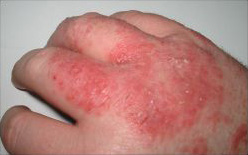High Dietary Inflammatory Index Linked to Increased Eczema Risk

A recent study published in the *Frontiers of Immunology* has established a significant association between a high Dietary Inflammatory Index (DII) and an increased prevalence of atopic dermatitis (AD), commonly known as eczema. Conducted by Kaiyue Tan and colleagues from The First Clinical College of Shandong University of Traditional Chinese Medicine in Jinan, China, the research utilized data from the Korean National Health and Nutrition Examination Survey conducted between 2017 and 2023. The findings, which were made public on June 19, 2025, indicate that individuals with higher DII scores exhibit a markedly elevated risk of developing AD.
The DII is a measure that quantifies the inflammatory potential of diet, and this study marks the first time such an association has been demonstrated in an Asian population. According to the research, participants in the highest DII quartile faced a 73% increased risk of AD compared to those in the lowest quartile, with an adjusted odds ratio of 1.73. The study also highlighted a significant interaction based on sex, revealing that women exhibited stronger associations between high DII scores and AD prevalence, particularly among those aged 54 and younger.
"This study provides new insights into the role of diet in inflammatory skin diseases, suggesting that dietary choices could significantly influence the risk of developing atopic dermatitis," stated Dr. Sarah Johnson, a dermatology expert at the University of California, Los Angeles, who was not involved in the study but commented on its implications.
The study's use of large-scale population-based data strengthens its validity, though the authors emphasized the need for further validation through repeated dietary measurements and prospective study designs. They noted that numerous anti-inflammatory dietary components were omitted from the analysis, which could affect the results.
Experts in the field have long acknowledged the potential link between diet and inflammatory conditions. Dr. Alex Chen, a nutrition researcher at Stanford University, noted that "understanding how dietary inflammation affects skin health is crucial, especially as dietary patterns evolve globally. This study opens avenues for further research into dietary interventions for skin diseases."
The implications of these findings extend beyond individual health, potentially influencing public health policies and dietary guidelines aimed at reducing the prevalence of eczema, particularly in vulnerable populations. The results align with previous studies that have also suggested a correlation between pro-inflammatory diets and various chronic health conditions, including cardiovascular diseases and autoimmune disorders.
In conclusion, as healthcare providers and researchers continue to explore the intricate connections between diet and health, this study underscores the importance of considering dietary inflammatory potential when addressing skin disorders like atopic dermatitis. Future research is essential to further elucidate these relationships and develop targeted dietary recommendations for at-risk populations, particularly given the increasing global burden of eczema and related inflammatory conditions.
Advertisement
Tags
Advertisement





